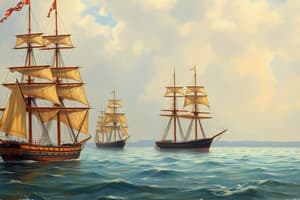Podcast
Questions and Answers
How do chance variations contribute to the survival of species during environmental changes?
How do chance variations contribute to the survival of species during environmental changes?
- They eliminate the need for species to reproduce.
- They prevent any single species from dominating the ecosystem.
- They allow for diverse adaptations that may suit new conditions. (correct)
- They create uniform traits among species.
What was significant about Darwin's prediction regarding the orchid from Madagascar?
What was significant about Darwin's prediction regarding the orchid from Madagascar?
- It highlighted the connection between species adaptations and their environments. (correct)
- It showed that orchids are capable of self-pollination.
- It demonstrated that all species evolve independently.
- It was the first prediction about species' relationships.
What role do beneficial mutations play in the context of evolution?
What role do beneficial mutations play in the context of evolution?
- They are detrimental to species survival in changing environments.
- They provide an unnecessary variety in the gene pool.
- They are the primary source of genetic uniformity.
- They can enhance an organism's fitness in a given environment. (correct)
What is the significance of 'habitat islands' in evolution?
What is the significance of 'habitat islands' in evolution?
What does the discovery of a new species signify in the study of evolution?
What does the discovery of a new species signify in the study of evolution?
What is the significance of Darwin's theory of evolution?
What is the significance of Darwin's theory of evolution?
What role did Darwin serve on the HMS Beagle?
What role did Darwin serve on the HMS Beagle?
Which of these ideas is NOT part of Darwin's theory of evolution?
Which of these ideas is NOT part of Darwin's theory of evolution?
What was one of the major beliefs about species during Darwin's time?
What was one of the major beliefs about species during Darwin's time?
What is natural selection?
What is natural selection?
How did Darwin's voyage on the HMS Beagle influence his scientific ideas?
How did Darwin's voyage on the HMS Beagle influence his scientific ideas?
What characteristic of the Frigate bird might have intrigued Darwin?
What characteristic of the Frigate bird might have intrigued Darwin?
What significant observation did Darwin make that contributed to his understanding of the Earth's changes?
What significant observation did Darwin make that contributed to his understanding of the Earth's changes?
How did the habitats of different Galápagos Islands influence the tortoise populations?
How did the habitats of different Galápagos Islands influence the tortoise populations?
What concept did Darwin use to describe the ability of organisms to survive and reproduce in their environment?
What concept did Darwin use to describe the ability of organisms to survive and reproduce in their environment?
What was one of the main influences on Darwin's theory of evolution by natural selection?
What was one of the main influences on Darwin's theory of evolution by natural selection?
What does natural selection depend on in the context of Darwin's theory?
What does natural selection depend on in the context of Darwin's theory?
Which fossil evidence contributed to Darwin's understanding of species change over time?
Which fossil evidence contributed to Darwin's understanding of species change over time?
What do the different shell shapes of Galápagos tortoises suggest about their adaptation?
What do the different shell shapes of Galápagos tortoises suggest about their adaptation?
What process did Darwin infer could lead to the formation of new species over time?
What process did Darwin infer could lead to the formation of new species over time?
What role did the observations during Darwin's voyage play in his theories?
What role did the observations during Darwin's voyage play in his theories?
What does Darwin's theory of evolution by natural selection illustrate about species?
What does Darwin's theory of evolution by natural selection illustrate about species?
Darwin's observations in tropical rainforests helped him understand the limited diversity of life.
Darwin's observations in tropical rainforests helped him understand the limited diversity of life.
The shape of Galápagos tortoises' shells is influenced by the different environments of the islands they inhabit.
The shape of Galápagos tortoises' shells is influenced by the different environments of the islands they inhabit.
Natural selection allows organisms with unfavorable variations to thrive in their environment.
Natural selection allows organisms with unfavorable variations to thrive in their environment.
Darwin inferred that artificial selection could not change domestic species over time.
Darwin inferred that artificial selection could not change domestic species over time.
Darwin believed that the variation in neck length among giraffes played no significant role in their survival.
Darwin believed that the variation in neck length among giraffes played no significant role in their survival.
Darwin's theory of evolution includes the idea that organisms remain unchanged over time.
Darwin's theory of evolution includes the idea that organisms remain unchanged over time.
The Frigate bird can be found in both Europe and South America.
The Frigate bird can be found in both Europe and South America.
Natural selection results in living things with beneficial traits producing fewer offspring than others.
Natural selection results in living things with beneficial traits producing fewer offspring than others.
Charles Darwin was the captain of the HMS Beagle during its voyage.
Charles Darwin was the captain of the HMS Beagle during its voyage.
Darwin's scientific expedition on the HMS Beagle began in 1831 when he was 22 years old.
Darwin's scientific expedition on the HMS Beagle began in 1831 when he was 22 years old.
Flashcards are hidden until you start studying
Study Notes
Frigate Bird and the Galápagos Islands
- The frigate bird inhabits the tropical Atlantic and the Galápagos Islands, notably absent from Europe and South America.
- Its distinct features, like the big red pouch, intrigue naturalists towards understanding adaptive traits.
Charles Darwin's Contributions
- Charles Darwin significantly advanced scientific understanding with his theory of evolution, unifying aspects of biology.
- Evolution occurs over time through changes in organisms, often linked to common ancestors.
- Key component: natural selection, where organisms with beneficial traits have a higher reproductive success, leading to trait changes over generations.
The Voyage of the Beagle
- Darwin embarked on the HMS Beagle in 1831 at age 22 as a naturalist, observing diverse life across continents.
- The journey lasted five years, with over three years dedicated to exploration and specimen collection.
- Darwin gained fame for his naturalist observations during and after the voyage.
Darwin's Observations and Insights
- Witnessed diverse ecosystems, including tropical rainforests, enhancing his appreciation for biodiversity.
- Experienced geological phenomena, like an earthquake that raised the ocean floor, suggesting Earth is dynamic and has a long history.
- Discovered fossils of extinct species, indicating changes in organisms over time.
Galápagos Islands and Species Variation
- The Galápagos Islands consist of 16 volcanic islands, each with unique ecological characteristics.
- Observed variations, such as tortoises with distinct shell shapes, prompting questions about species origin and adaptation.
- Differences in tortoise shells relate to environmental aspects, with adaptations influencing survival and breeding success.
Development of Darwin's Evolutionary Theory
- Influenced by the works of predecessors like Lamarck, Lyell, and Malthus, Darwin established key ideas for his theory.
- Recognized the significance of time in evolution, observing how populations could exceed resource availability leading to competition.
- Introduced the concept of fitness, defining it as an organism's ability to survive and reproduce.
Natural Selection Mechanism
- Proposed that chance variations occur among offspring, some providing advantages in survival.
- Favorable traits are selected naturally, increasing their prevalence in subsequent generations.
- Noted that over time, significant changes could lead to the emergence of new species.
Publication and Legacy
- Darwin's foundational book, On the Origin of Species, published in 1859, articulated his theories and provided substantial evidence for evolution.
- The book revolutionized biology, emphasizing the centrality of evolution in understanding life.
Contemporary Relevance of Evolution
- Evolution continues to progress, as indicated by ongoing research in species development and environmental adaptation.
- Modern examples of predicting new species highlight Darwin's enduring influence and relevance in biological sciences.
- Case study of the orchid illustrates the interconnectedness of species and evolutionary adaptations.
Conclusion
- Darwin's ideas remain integral to modern biology and scientific exploration, exemplifying how organisms evolve and adapt in response to their environments.
Frigate Bird and the Galápagos Islands
- The frigate bird inhabits the tropical Atlantic and the Galápagos Islands, notably absent from Europe and South America.
- Its distinct features, like the big red pouch, intrigue naturalists towards understanding adaptive traits.
Charles Darwin's Contributions
- Charles Darwin significantly advanced scientific understanding with his theory of evolution, unifying aspects of biology.
- Evolution occurs over time through changes in organisms, often linked to common ancestors.
- Key component: natural selection, where organisms with beneficial traits have a higher reproductive success, leading to trait changes over generations.
The Voyage of the Beagle
- Darwin embarked on the HMS Beagle in 1831 at age 22 as a naturalist, observing diverse life across continents.
- The journey lasted five years, with over three years dedicated to exploration and specimen collection.
- Darwin gained fame for his naturalist observations during and after the voyage.
Darwin's Observations and Insights
- Witnessed diverse ecosystems, including tropical rainforests, enhancing his appreciation for biodiversity.
- Experienced geological phenomena, like an earthquake that raised the ocean floor, suggesting Earth is dynamic and has a long history.
- Discovered fossils of extinct species, indicating changes in organisms over time.
Galápagos Islands and Species Variation
- The Galápagos Islands consist of 16 volcanic islands, each with unique ecological characteristics.
- Observed variations, such as tortoises with distinct shell shapes, prompting questions about species origin and adaptation.
- Differences in tortoise shells relate to environmental aspects, with adaptations influencing survival and breeding success.
Development of Darwin's Evolutionary Theory
- Influenced by the works of predecessors like Lamarck, Lyell, and Malthus, Darwin established key ideas for his theory.
- Recognized the significance of time in evolution, observing how populations could exceed resource availability leading to competition.
- Introduced the concept of fitness, defining it as an organism's ability to survive and reproduce.
Natural Selection Mechanism
- Proposed that chance variations occur among offspring, some providing advantages in survival.
- Favorable traits are selected naturally, increasing their prevalence in subsequent generations.
- Noted that over time, significant changes could lead to the emergence of new species.
Publication and Legacy
- Darwin's foundational book, On the Origin of Species, published in 1859, articulated his theories and provided substantial evidence for evolution.
- The book revolutionized biology, emphasizing the centrality of evolution in understanding life.
Contemporary Relevance of Evolution
- Evolution continues to progress, as indicated by ongoing research in species development and environmental adaptation.
- Modern examples of predicting new species highlight Darwin's enduring influence and relevance in biological sciences.
- Case study of the orchid illustrates the interconnectedness of species and evolutionary adaptations.
Conclusion
- Darwin's ideas remain integral to modern biology and scientific exploration, exemplifying how organisms evolve and adapt in response to their environments.
Studying That Suits You
Use AI to generate personalized quizzes and flashcards to suit your learning preferences.



